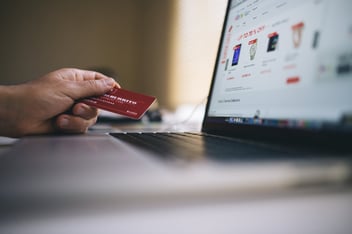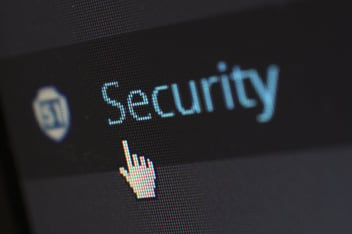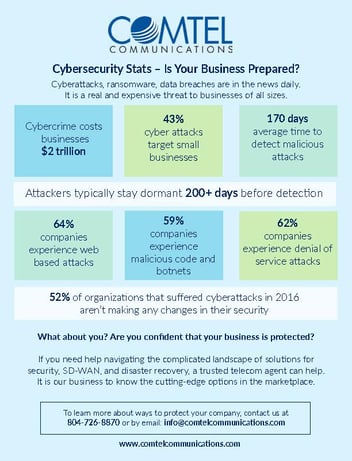How To Establish Cybersecurity For VoIP Systems
Like anything else connected to the internet, VoIP systems are vulnerable to cybercriminals and hackers looking to cause problems. Fortunately, these cybersecurity threats can be mitigated by following best practices to secure your VoIP system.
In this article, we’ll look at key VoIP security challenges and ways to implement cybersecurity for VoIP systems and to protect your business against cybersecurity threats.
As threat actors are constantly evolving their tactics, we continue to see record-setting numbers of attacks, including significant attempts to breach security using VoIP.
What Are Cybersecurity Threats to VoIP Systems?
Cyber threats using VoIP include eavesdropping on calls, stealing sensitive information about your company or customers, or running up huge phone bills. Cybercriminals also use VoIP systems as an attack vector to access your internal networks and cause even further damage.
Once hackers gain access to your VoIP system, they can perpetrate several types of fraud. Here are just a few types of threats you can face.
Toll Fraud
Cybercriminals use your VoIP account to make international calls which get charged to your account. In some cases, they call numbers they’ve set up to charge a fee for every minute you’re connected.
Business Impersonation (Spoofing)
Another common scam is when threat actors, using your phone number, impersonate your business. For example, they might call your clients and ask for payment information. Because customers recognize your phone number and trust you, they may be more likely to fall victim.
Eavesdropping
If your data is unencrypted, cyber criminals may be able to listen in on your calls or even record them. They may be able to check your voicemails and scan for sensitive information that can be used for criminal activity.
Other Types of VoIP Attacks
Other types of VoIP attacks include:
- Distributed Denial of Service (DDoS) to overwhelm servers
- Man-in-the-Middle attacks for intercepting data in transit
- Spam over IP Technology (SPAM) to send recorded messages
- Packet sniffing to steal and record unencrypted data
- Voice over Misconfigured Internet Telephone (VOMIT) to convert conversations into files.
Warning Signs You’ve Been Hacked
One of the big benefits of using VoIP is lowering the cost of your telephone service. In most cases, you get a consistent and predictable monthly charge, so if you suddenly see an increase in your bill, check it carefully to look for suspicious activity.
If international numbers start showing up in your call history when you don’t do a lot of business overseas, that may be another warning sign. You may also want to take a look to see whether there are a significant number of calls being made outside of normal working hours. Foreign actors work in different time zones.
How to Protect Against Cybersecurity Threats
You can protect yourself against cybersecurity threats by being proactive. That starts with making sure you’re working with the right VoIP provider.
Ensure End-to-End Encryption
The best VoIP providers will have multiple layers of security built into their systems, including end-to-end encryption. Transport Layer Security (TLS) and Secure Real-time Transport Protocol (SRTP) work together to provide high-level security during calls. When data is encrypted on every layer, even if calls are intercepted, the information will be unusable.
Enforce Strong Password Policies
All it takes is one hacker to guess a password to get access to your system. Make sure admins and employees use strong passwords to avoid making it easy for the bad guys.
Many users fail to change default passwords for accessing phone systems, yet these passwords are readily available online. Never leave default passwords in place.
Manage Remote Access
With the growing number of remote workers and distributed workforce teams, a virtual private network (VPN) can also help keep calls private when someone is working off-site. This provides additional encryption and hides IP addresses even when using public Wi-Fi.
You may also want to employ an SD-WAN with integrated security to manage access across all of your endpoints.
Keep Software Up-to-Date
Some of the biggest breaches over the past few years have come because companies failed to apply software patches for known exploits. Make sure all of your software is up-to-date, including employees that are using mobile phones for doing business on your VoIP network.
Restrict Calling
If you do not regularly do business overseas, restrict international calling or limit calling to those that need it for their work. You can also block 900 numbers, which charge a fee for access. Some organizations also choose to put time limits on calls to stop persistent connections used to rack up huge phone bills.
Include VoIP in Your Offboarding Process
When an employee leaves your company, make sure you deactivate their account. This prohibits them from using it and eliminates an additional threat vector for cybercriminals. Using mobile device management (MDM), you can also wipe devices remotely to delete VoIP soft client apps.
Routinely Review Call Logs
A good practice is to review your call logs regularly to look for any unusual activity. Often, cybercriminals will test systems by initiating something small before moving on to the larger cyber threats. For example, they might place a few international calls to make sure they go through. This might only add a few dollars to your bill that you might overlook. However, this lets hackers know they can use your system and they can activate it at any time they want.
Training and Education
Despite all of the security measures you put in place, the overwhelming majority of breaches occur because of human error. All it takes is one person to click on the wrong link in a phishing email to let threat actors gain access to your network, including your VoIP system. You should make sure employees follow best practices for cybersecurity to protect your entire network.
VoIP Attacks Can Have Serious Consequences
Not only can hackers disrupt your business and cost you money, but they can also put you at risk when it comes to compliance. Depending on your industry, you may be subject to compliance regulations such as HIPAA, PCI-DSS, Sarbanes-Oxley (SOX), Gramm-Leach-Bliley Act (GLBA), GDPR, CCPA, and more. Failing to take proper safeguards to secure protection information can lead to significant fines.
Make sure you take proactive measures to protect your VoIP system, your networks, and your employees.






